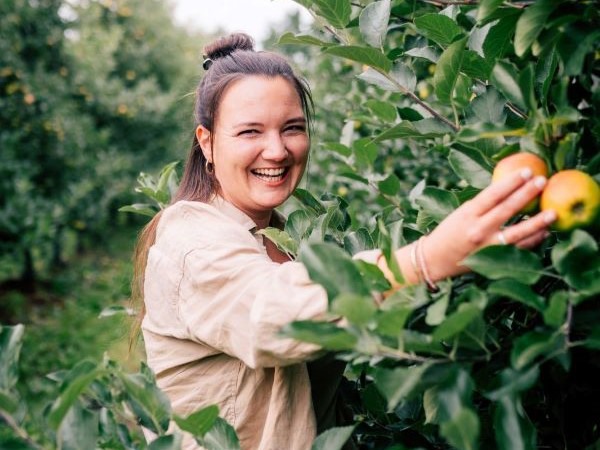"Due to the war in Ukraine and the subsequent domino effect of the energy crisis, inflation crisis, etc., there is uncertainty among the population. Consumer reluctance and a more frequent choice to buy cheaper products became particularly noticeable at the beginning of 2023." says Charlotte Otte from Obsthof Otte. "In addition, there was a large supply of apples on the German and European markets due to very high harvest volumes, which led to falling prices with rising production costs and the abolition of previous support. This is not a good mix for the economic stability of companies."
 Charlotte Otte. Photo: Obsthof Otte Sales.
Charlotte Otte. Photo: Obsthof Otte Sales.
Fair prices for high production standards
Furthermore, the rising production costs and high demands on ecological and social standards that stand for fair food production in Germany require fair prices, said Otte. "Over the course of the year, the demand situation has eased and the demand for high-quality, sustainable and regional products has increased again. With a view to climate change and the need for sustainable food production, the shift towards regional fruit produced in a resource-saving manner is increasing. However, the necessary framework conditions must be created in order to be able to produce these in Germany in the future." In recent years, some apple and pear orchards, especially organic apple orchards according to Naturland guidelines, have been replanted on Otte's farm.
Sharply increased production costs, new varieties
"The production costs are still at a high level. In some areas, material or energy costs had doubled. Some of them have fallen again, but we are nowhere near the levels we saw before the start of the Ukraine war. In addition to this, she said: "The personnel costs have increased significantly. Fruit growing, as a special crop, is still very manual labor-intensive and therefore personnel-cost intensive. With the increase in the minimum wage and the general wage level, the production costs therefore rise considerably. The input is getting higher and higher. This must also be reflected in the output. We are always curious and willing to experiment and are therefore always trying out new varieties. Our new favorite apple varieties are the Pia and Juicy varieties, and the super tasty 'Freya', in organic farming. When it comes to strawberries, we are already looking forward to the relatively new variety Rosaria, which will give us its first fruits again in May and is in its third year of cultivation."
Mechanization and digitalization for the future
In view of current and future challenges, she sees mechanization and digitalization as important topics. "They are important for the future of fruit growing and we are pushing them forward with full force. We attach great importance to cultural care measures. For example, when pruning trees: each individual tree is viewed individually and cut so that it can optimally develop its potential. However, mechanization and digitalization are associated with investments that require reliable planning. The political framework must also create more reliable perspectives in this context."
Focus on pricing will lead to the abolition of German agriculture
The trade strategies of the last few months have brought aggressive price promotions and discount prices to the fore. "One-sided focus on pricing will lead to food production being relocated abroad and German agriculture being abolished. The constantly increasing demands and the dismantling of previous supports, for example flat rates, diesel and car taxes, etc., show - contrary to all assurances - the disdain of politicians for German agriculture and domestic food production," said Otte.
"The current political decisions are leading to the abolition of German agriculture. We should have learned from the Corona and Ukraine crises how existentially important stable self-sufficiency - especially regarding food - is." Also, the current policies are leading to a reduced competitiveness of German agriculture. "It is crucial that high-quality food is valued and marketed as such. The high demands placed on German production are good, but they also have to be paid for. We will not produce for commercial lines that do not or just barely cover the production costs."
Discount strategies contradict sustainability
Retailers are in favor of sustainability and German food production. When it comes to sustainability, however, it should be noted that it includes a social, ecological and economic dimension. "The comprehensive orientation towards discount strategies of full-range retailers runs counter to this. Why are foreign products still offered by retailers when there are enough locally produced goods on the market, such as apples? Is strawberry production in Spain or Morocco sustainable? Apart from the long transport routes, there is a water shortage in these countries. In Spain, water resources from nature reserves were illegally used to irrigate strawberry fields," says Otte.
"While the large food retail companies continue their stable growth trends, more and more agricultural businesses in Germany are closing their doors forever. How can this be? This is not economically sustainable. We produce top products under fair production conditions. Our goal is to convince people of the taste, to give them an understanding of the background of fruit cultivation and the importance of sustainability and diversity, and to get them excited about our apples, pears, strawberries, raspberries and plums."
The fruit farm was able to record good annual development numbers for the latter products. "However, weather extremes are increasingly leading to crop failures. For example, heavy rain has now led to flooding in the strawberry fields, and in neighboring regions there has been major hail damage. The challenges caused by climate change-related consequences are becoming increasingly noticeable," Otte concluded.
For more information:
information:
Charlotte Otte
Obsthof Otte Vertrieb
Heidestr.42
32120 Hiddenhausen
Tel. +49 5223-83400
Fax: +49 5223-87401
Email: info@obsthof-otte.de
www.obsthof-otte.de
